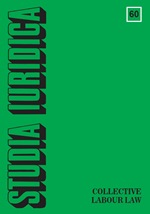Employee Representation in Collective Labour Disputes – de lege lata and de lege ferenda
Employee Representation in Collective Labour Disputes – de lege lata and de lege ferenda
Author(s): Bogusław CudowskiSubject(s): Law, Constitution, Jurisprudence
Published by: Wydawnictwa Uniwersytetu Warszawskiego
Keywords: employee representation; collective labour dispute; Act on Resolution of Collective Disputes; trade union; non-unionised employee representation; collective rights and duties
Summary/Abstract: The author concentrates on the problem of employee representation in collective labour disputes. According to the Polish Act on Resolution of Collective Disputes, employee rights and interests are represented in a collective dispute by trade unions. The trade unions enjoy, in fact, a monopoly to represent the employee party in a collective dispute. An essential problem is that in a majority of workplaces there are no trade unions. Consequently, in the existing legal environment employees at such places do not have the capacity to protect their collective rights and interests by conducting collective disputes. In the opinion of the author, this justifies the possibility of allowing non-unionised employee representative bodies to participate in a collective dispute. It is necessary in order to secure due protection of collective rights and duties of employees at workplaces with no active unions operating. The Constitution of Poland and Community law does not prevent a non-unionised employee body from representing the employee party in a collective dispute. In a number of countries, the right of non-unionised representatives to represent employees in collective disputes is recognized. The second problem pointed out by the author is that in the current legal environment, even a trade union organization of very small membership can conduct a collective dispute with the employer and represent all those employed by him. There is no requirement of representativeness. In such a situation, the body representing the staff is not actually legitimized to conduct the collective dispute on behalf of all the employees. Also in this area an amendment to the legislation in force is needed.
Journal: Studia Iuridica
- Issue Year: 2015
- Issue No: 60
- Page Range: 27-39
- Page Count: 13

